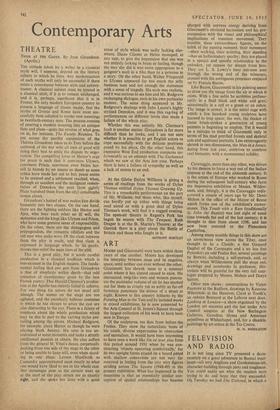Contemporary Arts
THEATRE
TIGER AT TFIE GATES. By Jean Giraudoux. (Apollo.) Tim attitude taken by a writer to a classical myth will, I suppose, depend on the literary culture in which he lives. Any modernisation of such myths will only be successful if there exists a consonance between style and subject- matter. A classical subject must be treated in a classical style, if i,t is to remain unchanged, and it is, perhaps, significant that it is in France, the only modern European country to possess a language of classic stamp, that the myths of Greece and Rome have most suc- cessfully been adapted to render new meanings to twentieth-century man. The process consists of pouring a modern meaning into an antique time and place—quite the reverse of what goes on in, for instance. The Family Reunion. To put across the pacifist aspirations of the Thirties Giraudoux takes us to Troy before the outbreak of the war with all men of good will doing their best to settle the dispute by nego- tiation. The compelling force of Hector's urge for peace is such that it convinces Ulysses, convinces Priam, convinces even Helen her- self (a blonde by no means so dumb as some critics have made her out to be); peace seems to be secured and a settlement reached, when. through an accident and the malignant roman- ticism of Demokos the poet (how rightly Plato banished them from the city) catastrophe comes about.
Giraudoux's hatred of war makes him divide humanity into two classes. On the one hand, there arc the fighting soldiers like Hector and Ajax, who bear each other no ill will, the statesmen and the kings like Ulysses and Priam, who have some genuine sense of responsibility. On the other, there are the demagogues and propagandists, the romantic nihilists and the old men who make wars. Of the clash between them the play is made, and that clash is expressed in language which, by its purity, throws into relief the main lines of the plot.
This is a good play, but it needs careful production in a classical tradition which is non-existent in the English theatre. The funda- mental feeling that one gets from Giraudoux is that of simplicity within depth—that odd sensation of translucency given by the best French poetry. This Harold Clurman's produc- tion at the Apollo has entirely failed to achieve. For one thing his actors do not stand still enough. The scenes on the stage are too agitated, and the peculiarly hideous costumes in which he has chosen to attire the cast are also distracting to the eye. There is a falsity of emphasis about the whole production which may be due in part to the varying styles pre- vailing among the actors. Michael Redgrave, for example, plays Hector as though he were playing Mark Antony. His tone is too un- est rained at some moments and lacks a strictly intellectual passion at others. He also suffers from the general St. Vitus's dance, perpetually dashing from one side of the stage to the other or being unable to keep still, even when stand- ing in one place. Leveen MacGrath as Cassandra approximated most nearly to what one would have liked to see in the whole cast.
sense of style which was sadly lacking else- where. Diane Cilento as Helen managed, at any rate, to give the impression that she was not entirely lacking in brain or feeling, though the way she did it was more appropriate to a gangster's moll in a film than to a princess in a story. On the other hand. Walter Fitzgerald as Ulysses appeared far too much the jolly business man and not enough the statesman with a sense of tragedy. His style was realistic, and it was curious to see him and Mr. Redgrave exchanging dialogue, each in his own particular manner. The same thing appeared in Mr. Redgrave's dealings with John Laurie's highly stylised Dcmokos, and it was this rag-bag of performances on different levels that made a failure of the whole play.
Whether this was entirely Mr. Clurman's fault is another matter. Giraudoux is far more difficult than he looks, and I am not sure whether it is possible to get English actors to cope successfully with the delicate problems posed by his plays. On the other hand, this expensive West End production compares un- favourably as an attempt with The Enchanted which we saw at the Arts last year. Perhaps there is here a failure of sympathy as well as a lack of means to an end.
At the Globe Emlyn Williams is giving a series of readings from the works of Dylan Thomas entitled Dylan Thomas Growing Up. This is a remarkable performance on the part of Mr. Williams, but those who, like myself, can hardly put up either with things being read aloud or with a great deal of Dylan Thomas's work, will find it a rugged evening. The open-air theatre in Regent's Park has begun its season with The Tempest; Ruth Draper is at the St. Martin's Theatre; at the Garrick there is a play about the Battle of Britain and those who fought in it.










































 Previous page
Previous page